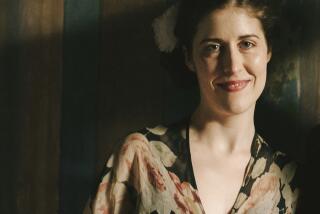Magical Metaphysics : THE CONVERSATIONS AT CURLOW CREEK.<i> By David Malouf</i> .<i> Pantheon: 240 pp., $23</i>
- Share via
Adair, a British army officer, has ridden out of Sydney into the Australian Outback to supervise the hanging of Carney, one of a band of escaped indentured laborers. In the insecure imagination of authorities perched on the rim of a vast, unsettling hinterland in the 1820s, the outlaws, mostly Irish, may conceivably have been plotting an insurrection.
Adair is in Australia to pursue an illusion nurtured from his childhood in an Ireland very different from Carney’s: that of the gentry. During a spasmodic nightlong conversation in a fetid hut, with three soldiers camped on the moon-drenched barrens outside, he tests his life and illusions against those of the condemned man. By the end of “The Conversations at Curlow Creek,” a wise and magical novel, illusions have given way to something approaching a human truth.
David Malouf is one of several present-day Australian writers to use the immensity and oddity of their country’s geography and its history of involuntary settlement by convict labor as fictional metaphor. They translate it into a condition that is special to a land whose features defeated its settlers’ expectations--rivers that led nowhere, lunar landscapes like illustrations in a malevolent fairy story, a weird pouched and duck-billed fauna. But it is also applicable to a more universal contemporary sense of having been brought, in spite of ourselves, into a world increasingly strange and unmanageable.
To these writers, among them Rodney Hall and Janette Turner Hospital, the wide-open spaces convey something very different than they do in the American West: not freedom but menace. Malouf, the finest of them (two years ago he won the annual Los Angeles Times fiction prize for “Remembering Babylon”), goes a step further. Beyond the threat there is wisdom. He is a writer at once powerful and tender, with the ability--somewhat resembling that of another “colonial” English writer, the Canadian-Sri Lankan Michael Ondaatje--to transform a gaunt metaphysics with the enchantments of human and poetic resourcefulness.
Entering Carney’s hut upon his arrival, at night, Adair is at first aware only of a feral smell and the shifting about of an animal-like creature. Bit by bit a transformation sets in that will bring into balance the disparate conditions of officer and prisoner. Alone with Carney, Adair begins to sense the latter’s vital energy and the imperious human claim he asserts. In “gentleman” and “condemned man” both, it is “man” that is the noun.
Before the night is up it will be two men interrogating each other and, beyond each other, life. Almost without our realizing, Malouf makes us aware of his book’s breathing paradox: Hanging is done by the hanged man. As with all of us, it is his body that pulls him down. The long night’s conversations in the hut, interrupted by dozing silences, are the stories of two hangmen and two victims.
Adair, for reasons we shall see, tries to interrogate Carney about Dolan, the outlaws’ leader, who was shot dead in a gun battle. It is Carney, though, deferential but persistent, who does most of the questioning. He wants to tell of his life, examine it, get it in order: He asserts his human right to be heard.
It was a hard, pitiless life, first as an itinerant, starving worker in Ireland, later as a transported convict in Australia. He had killed a man to prevent him from abusing another man; he needs Adair’s judgment. But his questions are themselves a kind of judgment and they resonate in his captor. He ponders the bleak, gray landscape of the Australian Outback: Is this a punishment for Irishmen who have done wrong? “I thought, maybe if I work me crimes out, or me sins, which is more difficult, I’ll just maybe wake up one mornin’ and there it’ll be, all fresh and green, the old country. . . .”
And what crimes has he himself committed, Adair asks, a touch patronizingly. The reply is modest and crushing. “I wouldn’t know that, sir. It’s for each man to say for himself. An’ get out as best he can.”
While Carney, humbly but determinedly and with flashes of devastating insight, invokes Adair’s witness to examine the mystery of his life and to prepare to die, the latter is moved to think of his own story and the quest that brought him to Australia. It is the romance of a golden childhood in which reality and the fabulous are entwined.
An orphan, Adair was raised by the flamboyant mistress of a broken-down Irish estate. Mama Aimee, married to the dissolute, hard-riding and carousing master of the place, manages, incompetently, with the help of a temperamental housekeeper who imagines herself the lady of the manor and a fierce, and fiercely loyal, butler. Childless, Aimee cherishes the child Adair to the point of lasciviousness; then, almost past child-bearing, she bears a son, Fergus.
She is oddly cold to him; Adair, who remains her favorite, minds Fergus solicitously and takes him along on his daily escapes from Aimee’s chaos to the flourishing estate next door. There the master is a humane aristocrat possessed of a fine library, progressive opinions and a patrician kindness. The chief attraction, though, is Virgilia, a spirited child with a devastating--to a susceptible boy--mixture of the fey and the practical.
Fergus, beautiful and saintly as a baby, grows up to be a wild young man of great charm. Both Virgilia and Adair--who confesses to a soft spirit that he has tried to discipline by joining the army--are under his spell in different ways. Virgilia is in love with him; Adair, who loves Virgilia, resigns himself to be her confidant and Fergus’ mentor.
As long as Fergus lets him, that is. He vanishes for long periods; at one point he takes Adair and Virgilia to see an impoverished family he has been taking care of. By the time he disappears permanently, in fact, Fergus has come to represent an unearthly, perhaps even a Christlike, spirit of social revolt, in contrast to Virgilia, who passionately and gracefully stands for embellishment of the social establishment.
Malouf describes her superintending the weekly laundry, with the wash spread over half an acre to dry and two dozen servants rushing out to pluck it in before the rain. He writes it as a splendid, joyful, colliding, celebratory dance.
Years later, at Virgilia’s behest, Adair has volunteered for Australia following a rumor that Fergus was seen there. His efforts to interrogate Carney about Dolan, in fact, arise from a described similarity: Both are unusually tall and have the gift of handling horses. There is a beautiful moment in which Carney is persuaded to hum Dolan’s favorite tune (not, it turns out, one that Fergus used to sing).
In the dark hut, Malouf writes, “The shape it made created its own following silence, and they sat, both in the ease of it. Once again they were, as the old tune lingered, just two men in the one place, in the one moment together, and far from where they had begun.”
Two men in one place, gentleman and vagrant. Malouf’s novel, brief but rich, uncompromisingly engaged but poetically artful, brings other figures to that one place; there are, for example, brilliant portraits of the three very different soldiers who stand guard outside, haunted by the great darkness of a landscape that itself is one of the book’s formidable characters. His people never master the land, but each of them, in his own way, conjures a magic that it cannot extinguish.
More to Read
Sign up for our Book Club newsletter
Get the latest news, events and more from the Los Angeles Times Book Club, and help us get L.A. reading and talking.
You may occasionally receive promotional content from the Los Angeles Times.










